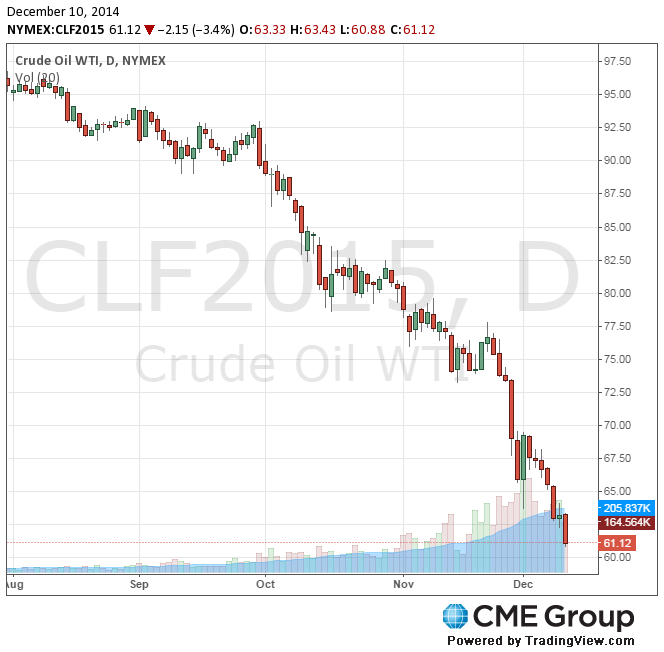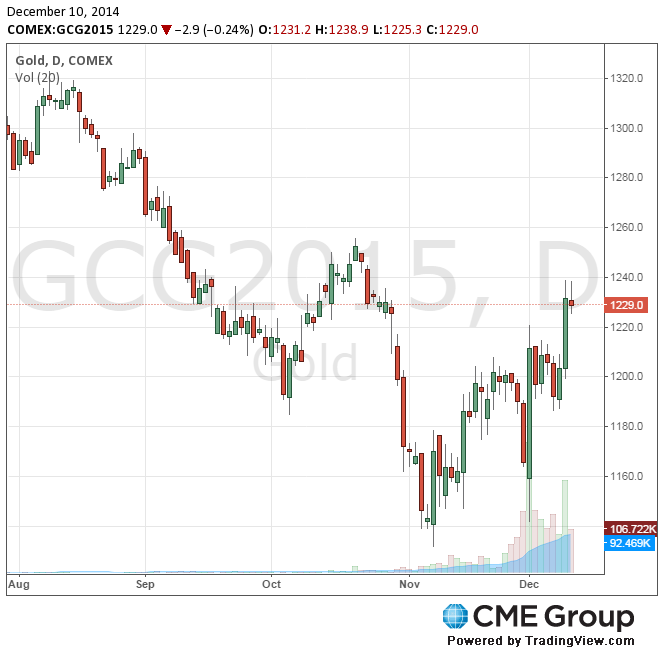Notícias do Mercado
-
23:30
Commodities. Daily history for Dec 10’2014:
(raw materials / closing price /% change)
Light Crude 61.22 +0.46%
Gold 1,225.60 -0.31%
-
16:40
Brent crude drops below $65 as OPEC sees less demand
Brent fell to less than $65 a barrel for the first time in more than five years after OPEC cut the forecast for how much crude oil it will need to provide in 2015 to the lowest since 2003.
Futures in London declined as much as 2.8 percent to $64.98, the lowest level since Sept. 29, 2009, extending this year's decline to 41 percent. OPEC lowered its projection for 2015 by about 300,000 barrels a day to 28.9 million a day in its monthly report today. That's about 1.15 million less than the group's 12 members pumped last month.
Brent collapsed 16 percent in London after OPEC agreed to leave its production limit unchanged at 30 million barrels a day on Nov. 27, resisting calls from members including Venezuela to cut output to stabilize prices. The decision prompted the biggest one-day decline in prices in more than three years.
"Another target bites the dust," Eugen Weinberg, head of commodities research at Frankfurt-based Commerzbank AG, said by phone before the OPEC report was published. "We are still searching for the bottom, and may not find it until OPEC changes policy or low prices begin to eat into production."
Brent for January settlement decreased $1.65, or 2.5 percent, to $65.19 a barrel at 10:08 a.m. New York time on the London-based ICE Futures Europe exchange. Prices slumped 7.2 percent this month after a drop of 18 percent in November.
WTI for January delivery fell as much as 3.1 percent to $61.82 a barrel on the New York Mercantile Exchange, the lowest since July 2009.

-
16:22
Gold traded near seven-week high
Gold prices traded around yesterday reached a maximum of seven weeks due to the weakening of the dollar and the stock market downturn.
Increase in gold prices on the eve of observed against the background of a drop in prices on world stock markets after Monday night clearinghouse China banned investors use corporate bonds with low ratings as collateral for short-term financing. This decision was made as part of Beijing's attempts to reduce financial risks and to support long-term growth.
"Stock indexes fall, and investors are looking at gold as a cheaper safe-haven than what they can get in the bond market," - said Adam Klopfenshteyn, senior market strategist at Archer Financial Services, Inc. Chicago.
Gold futures were trading 38% below its record high reached in August 2011, while the prices of US Treasury bonds, which are an alternative safe haven, remain near historic highs. As a result, gold is currently more attractive investment adds Klopfenshteyn.
"Gold can rise if the financial markets are worried about the weakening Chinese stocks, concerns over the euro zone and the instability of the currency market," - said HSBC analyst James Steel.
"There is an opportunity to continue covering short positions, especially if sustained volatility in the stock markets in Asia. A further increase in the prices will start to dampen demand in Asia, depending on the price, and could threaten the rally."
The world's largest reserves of gold secured fund ETF SPDR Gold Trust on Tuesday rose 0.37 percent to 721.81 tons, but still close to six-year low.
The cost of the February gold futures on the COMEX today fell to 1225.30 dollars per ounce.

-
11:20
Oil: Prices resume decline
Brent crude and West Texas Intermediate are trading closer to five-year lows. Brent Crude lost -1.18% trading at USD66.05 a barrel, and West Texas Intermediate declined -1.55% currently quoted at USD62.83. Oversupply and slowing global economic growth continue to weigh on prices. A price war between Saudi Arabia and Iraq, the two largest producers within the OPEC, puts further pressure on prices as they fight for market shares. Yesterday Algeria's Energy Minister said that there is a possibility of an emergency meeting of the OPEC before the scheduled meeting in June. Crude inventories in the U.S expanded by 4.4 million barrels to 377.4 million barrels last week according to the API. Analysts expected a decline by 2.2 million barrels.
-
11:00
Gold prices decline slightly after yesterday’s rally
Gold prices fell slightly pulling back from yesterday's strong gains currently quoted at USD1,226.30 or -0,26% a troy ounce. Yesterday's gains were fuelled by a weak greenback and retreating global stocks after Greece's political turmoil making the safe-haven investment in the precious metal more attractive - reaching the highest level in almost seven weeks. A weak dollar usually boosts gold's appeal as an alternative asset and reduces the cost of dollar-denominated commodities for buyers in other currencies.
Despite recent gains the metal is likely to remain vulnerable in the short term amid signs that the strengthening of the US economic recovery may prompt the Federal Reserve to start raising interest rates sooner than expected.
GOLD currently trading at USD1,226.30
-
09:20
Press Review: ECB’s Praet Says Falling Oil Price May Push Inflation Below Zero
REUTERS
U.S. fracking bonanza to lift GDP by 1 percent by 2040: study
(Reuters) - A surge of oil and gas production will drive the U.S. economy 1 percent higher in 2040 than it would have otherwise grown, and energy exports will only stoke the expansion, an independent study on energy policy concluded on Tuesday.
New drilling technologies such as 'fracking' have unlocked an abundance of fossil fuels from shale deposits and the bounty will both jolt the economy and increase tax receipts, according to the study from the Congressional Budget Office.
Source: http://www.reuters.com/article/2014/12/10/us-usa-energy-economy-idUSKBN0JN2JD20141210
BLOOMBERG
ECB's Praet Says Falling Oil Price May Push Inflation Below Zero
European Central Bank Executive Board member Peter Praet said falling oil prices could push the euro-area inflation rate below zero, just as policy makers prepare to examine options for quantitative easing.
"Given the potency of the current oil-price shock, the risk is that inflation may temporarily fall into negative territory in coming months," Praet said in Washington yesterday. "Normally, any central bank would prefer to look through a positive supply shock. After all, lower oil prices boost real incomes and may lead to higher output in the future. But we may not have that luxury at present."
BLOOMBERG
Russia Set to Raise Main Rate as Ruble Rout Endangers Stability
Russia's central bank will probably raise borrowing costs to avert threats to financial stability as oil prices near the lowest in more than five years and sanctions over Ukraine risk the collapse of the ruble.
The Bank of Russia will increase its key rate to 10 percent from 9.5 percent, according to the median estimate of 27 economists surveyed by Bloomberg. Eleven forecast no change. Fifty of 77 traders polled by brokerage Tradition project a rate increase of between 100 and 400 basis points. The regulator will announce the decision at about 1:30 p.m. tomorrow in Moscow, followed by a news conference.
-
00:01
Commodities. Daily history for Dec 9’2014:
(raw materials / closing price /% change)
Light Crude 63.27 -0.86%
Gold 1,231.90 -0.01%
-
